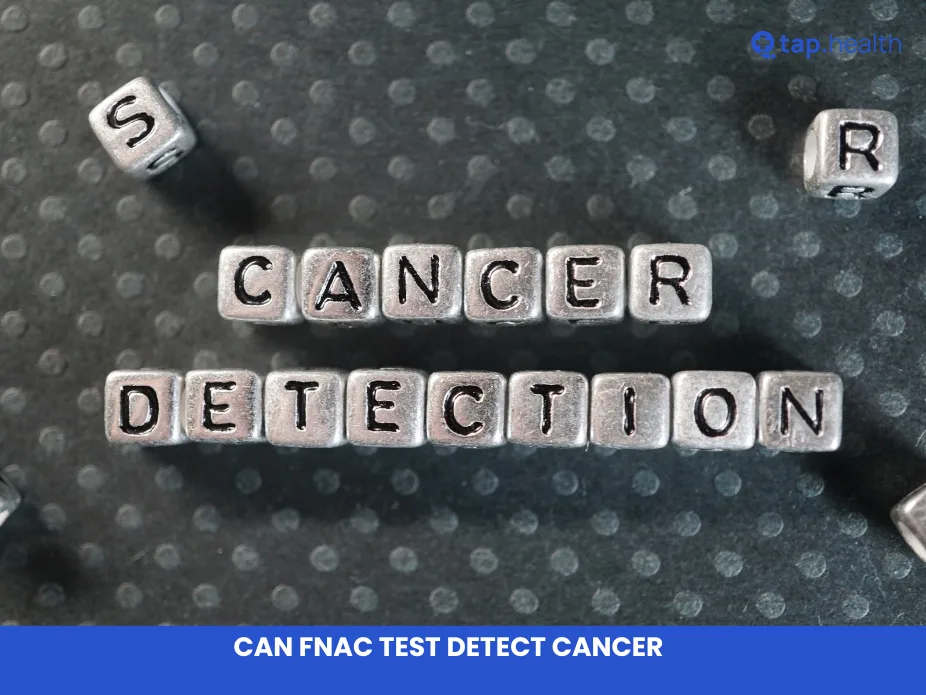When it comes to detecting cancer, early diagnosis is crucial. One of the tools doctors use is the FNAC test. But can FNAC test detect cancer? Let’s break it down in simple terms.
What is FNAC?
FNAC stands for Fine-Needle Aspiration Cytology. It’s a quick and minimally invasive procedure where a thin needle is used to collect cells from a lump or mass in the body. These cells are then examined under a microscope to check for cancerous changes.
How Does FNAC Work?
- Preparation: The area to be tested is cleaned and sometimes numbed with a local anesthetic.
- Collection: A thin needle is inserted into the lump or mass to collect cells.
- Analysis: The collected cells are spread on a slide, stained, and examined by a pathologist for signs of cancer.
Can FNAC Detect Cancer?
Yes, FNAC can detect cancer. It’s commonly used for lumps in the breast, thyroid, lymph nodes, and other areas. Here’s why it’s effective:
- Quick Results: Often, results are available within a day or two.
- Minimal Discomfort: It’s less invasive compared to surgical biopsies.
- Cost-Effective: Generally cheaper than other diagnostic methods.
However, FNAC isn’t perfect. Sometimes, it might not provide enough information, and additional tests may be needed.
Advantages of FNAC
- Low Risk: Minimal complications compared to other biopsy methods.
- Outpatient Procedure: No need for hospital admission.
- Versatile: Can be used on various parts of the body.
Limitations of FNAC
- Accuracy: While highly accurate, there’s a small chance of false negatives or inconclusive results.
- Sample Size: May not collect enough cells for a definitive diagnosis in some cases.
Real-Life Scenarios
Meet Amit Sharma, a 45-year-old from Mumbai. Amit noticed a lump in his neck and visited a local clinic. His doctor recommended an FNAC test to check for cancer. The procedure was quick and relatively painless. Within two days, Amit received his results, which showed benign cells. This early detection allowed Amit to stay informed and continue regular health check-ups.
In another case, Priya Mehta from Delhi felt a lump in her breast. An FNAC test revealed cancerous cells, enabling her to start treatment promptly. Without the FNAC test, her cancer might have gone undetected longer, potentially affecting her prognosis.
Expert Contributions
Dr. Anjali Rao, a renowned oncologist in Bengaluru, emphasizes the importance of FNAC in cancer detection. She states, “FNAC is a reliable and efficient method for diagnosing various cancers. Its minimally invasive nature makes it a preferred choice for both patients and clinicians.” Source
How Accurate is FNAC?
FNAC has a high accuracy rate, often exceeding 90%, especially when performed by experienced professionals. Its accuracy depends on factors like the skill of the practitioner and the area being tested.
What to Expect During an FNAC Test
- Preparation: You might be asked to fast for a few hours before the test, depending on the area being tested.
- Procedure: The doctor will use a fine needle to collect cells. You might feel a slight pinch or discomfort.
- Aftercare: Usually, you can resume normal activities immediately. Some minor bruising or soreness at the needle site may occur.
When is FNAC Recommended?
- Breast Lumps: To differentiate between benign and malignant tumors.
- Thyroid Nodules: To assess thyroid cancer.
- Lymph Nodes: To detect lymphoma or metastatic cancers.
- Soft Tissue Masses: To identify sarcomas and other soft tissue cancers.
Alternatives to FNAC
While FNAC is effective, other methods might be recommended based on the situation:
- Core Needle Biopsy: Uses a larger needle to collect more tissue.
- Surgical Biopsy: Involves removing a larger tissue sample surgically.
- Imaging Tests: Such as MRI or CT scans to get detailed images of the area.
Preparing for an FNAC Test
- Consult Your Doctor: Discuss any medications you’re taking.
- Follow Instructions: You may need to fast or avoid certain activities before the test.
- Arrange Transportation: If you’re sedated, you might need someone to drive you home.
Post-FNAC Care
- Monitor the Site: Look for signs of infection like redness, swelling, or excessive pain.
- Follow-Up: Your doctor will discuss the results and the next steps based on the findings.
Cost of FNAC in India
FNAC is generally affordable in India, with costs ranging from ₹500 to ₹2,000, depending on the location and the facility. It’s often covered by health insurance plans, making it accessible to many patients.
Why Choose FNAC?
- Early Detection: Helps in identifying cancer early, improving treatment outcomes.
- Convenience: Quick procedure with fast results.
- Safety: Lower risk compared to more invasive biopsy methods.
Recommendations Grounded in Proven Research and Facts
Research shows that FNAC is a highly effective tool for cancer detection when used appropriately. Studies published in journals like the Indian Journal of Pathology and Microbiology highlight its reliability and efficiency in diagnosing various cancers. For optimal results, it’s essential to have the procedure performed by trained professionals and to follow up on any inconclusive results with additional tests if necessary.
Factual and Reliable Information
The information provided here is based on authoritative health sources, including the American Cancer Society and National Cancer Institute. FNAC remains a cornerstone in the early detection and diagnosis of cancer, offering patients a straightforward and reliable option.
FAQ on Can FNAC Test Detect Cancer?
1. Can FNAC detect all types of cancer?
FNAC is effective for many cancers, especially those in accessible areas like the breast, thyroid, and lymph nodes. However, it may not be suitable for all cancer types, and sometimes additional tests are required.
2. Is FNAC painful?
FNAC is generally not painful. Some patients may experience slight discomfort or a brief pinch during the procedure.
3. How long does it take to get FNAC results?
Results are usually available within one to two days after the procedure.
4. Are there any risks associated with FNAC?
FNAC is considered safe with minimal risks. Minor bruising or soreness at the needle site can occur, but serious complications are rare.
5. Do I need to prepare for an FNAC test?
Preparation is minimal. You might be advised to avoid certain medications or fast for a few hours, depending on the test area. Always follow your doctor’s instructions.
6. What happens if FNAC results are inconclusive?
If results are inconclusive, your doctor may recommend additional tests such as a core needle biopsy or surgical biopsy for a more comprehensive analysis.
7. Can FNAC be used for children?
Yes, FNAC can be safely performed on children and is often used to diagnose cancers in pediatric patients.
8. Is FNAC covered by insurance in India?
Many health insurance plans in India cover FNAC tests, but it’s best to check with your provider for specific coverage details.



